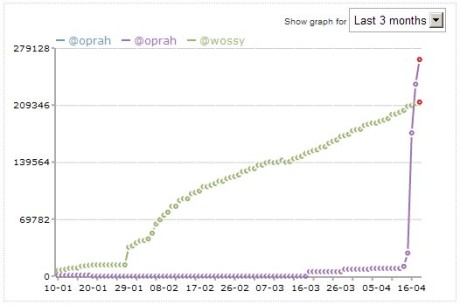Oprah joins Twitter
With Oprah Winfrey joining Twitter, expect an influx from Middle America, and a backlash from the press. But remember, it's all part of the technology Hype Cycle

Oprah's followers versus Jonathan Ross's at TwitterCounter
The big event on Twitter last week was Oprah Winfrey making her first tweet, live on her show, with the help of Twitter co-founder Ev Williams. "HI TWITTERS," she shouted, "THANK YOU FOR A WARM WELCOME. FEELING REALLY 21st CENTURY."
The show also crowned Ashton Kutcher King of Twitter for becoming the first user with a million followers, following a race with the CNN Breaking News account.
Oprah is a huge power in the US, as we have seen from her book club and magazine. Where Oprah leads, thousands if not hundreds of thousands follow -- starting with Gayle King from Oprah's magazine. Indeed, Oprah's own following has already zoomed past many of the UK's favourite tweeters, including Jonathan Ross. There's no telling where it will end.
If you missed the event, you can watch the two YouTube videos on the Mashable post, Ashton Kutcher and Evan Williams Talk Twitter With Oprah [Video].
Kutcher made the right noises about the "democratization of media" -- that "one man can have a voice that's as loud as an entire media company". He also talked about the ability to correct stories about him by talking directly to fans, instead of going through publicists, journalists and other intermediaries.
Whether Kutcher's achievement will survive close scrutiny is another matter. NowPublic has already questioned it in Ashton Kutcher Punks Twitter: A Giant Million Follower PR Stunt. It says:
This is not a story of the "little man" beating out "big media" — this is the story of a major Hollywood celebrity orchestrating a massive, social media publicity campaign that was specifically designed to promote himself, Twitter and, by extension, Ted Turner and CNN.
Kutcher's effort was promoted on 1,133 digital billboards, it says, and "as the race to the million follower finish line approached last night, Twitter users were suspiciously blocked from unfollowing either Ashton or CNN". It reckons the show needed someone to make the million, though (as suggested in comments) it might simply have been a way to prevent people gaming the system to try to win the prize for the millionth follower.
It also remains to be seen whether 4chan got involved. Members of this bulletin board belatedly entered the race, using hundreds of thousands of fake accounts.
Ev was less impressive than Kutcher, and ducked the chance to say something useful about Twitter policy on fakesters. Oprah pointed out that anyone could set up an account and pretend to be Oprah, so how would anyone know an account was the real thing? This is a serious problem that, at the moment, is being handled at the grass roots level by sites such as Valebrity. Ev's answer was that "our people know your people," which is no use at all to many millions of people with some species of fame.
Twitter is a tiny 30-person company, and if you are, for example, an actor on EastEnders or Corrie, or an author or a pop band, your people (if any) certainly don't know their people.
Still, Twitter was growing at a rapid rate, and Oprah's arrival is likely to boost it. This will make Twitter less select and less geeky, and that might attract different kinds of attack. Gartner analyst Mark Raskino, co-author of Mastering The Hype Cycle, thinks the process may already have started., His post, Classic Hype Cycle turn signal: 'Twitter Backlash' reported, picks up on a New York Observer headline that caught his attention: 'Twitter Sucks!' The Backlash Begins. Among other things, this points to "an entire blog devoted to chronicling the "Twitter Backlash".
Raskino says:
Remember the innovation is microblogging (and there are competitors) - so let's forget the company name for a moment. This technology innovation example is particularly interesting because the technology is of direct relevance to journalists and media people in their own jobs. So naturally they will discuss it more and the situation is unusually amplified. As they compete for audience attention we will tend to see more extreme hyperbole and backlash. That helps make this innovation a particularly clear reference example, as it passes through the early stages of the Hype Cycle.
The benefit of the Hype Cycle, of course, is that it helps you regard the backlash in the same way as the hype. Neither is worth taking too seriously: they're just a normal part of the way technologies grow up.
reff: Jack Schofield /

No comments:
Post a Comment